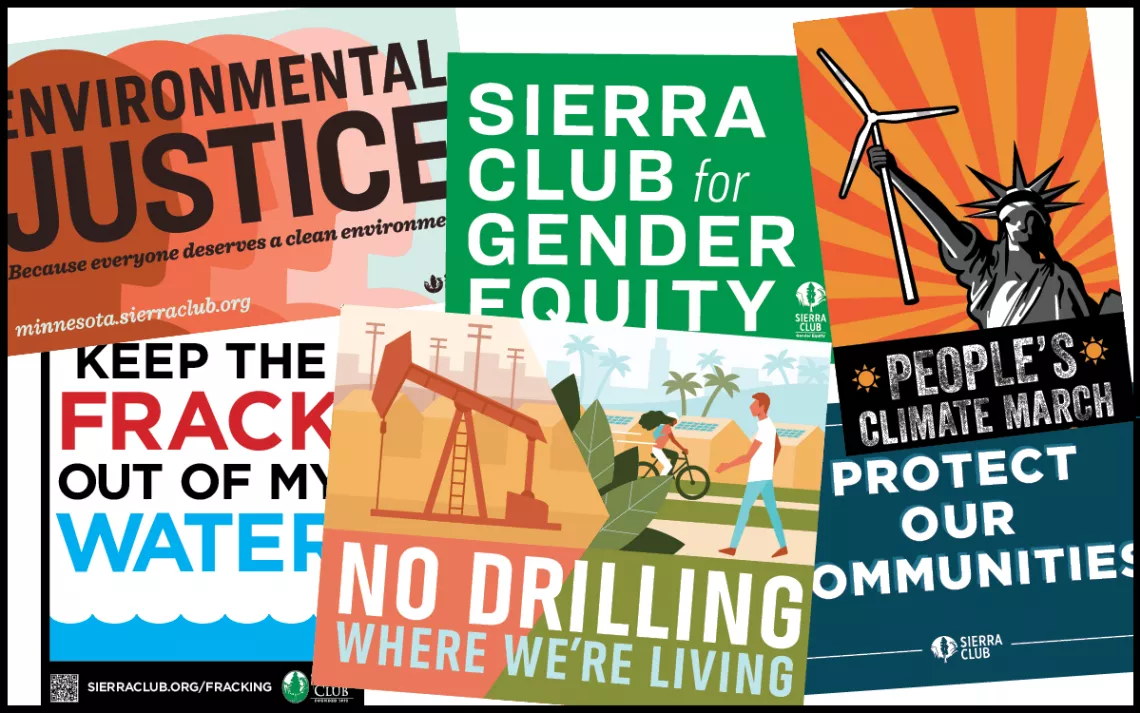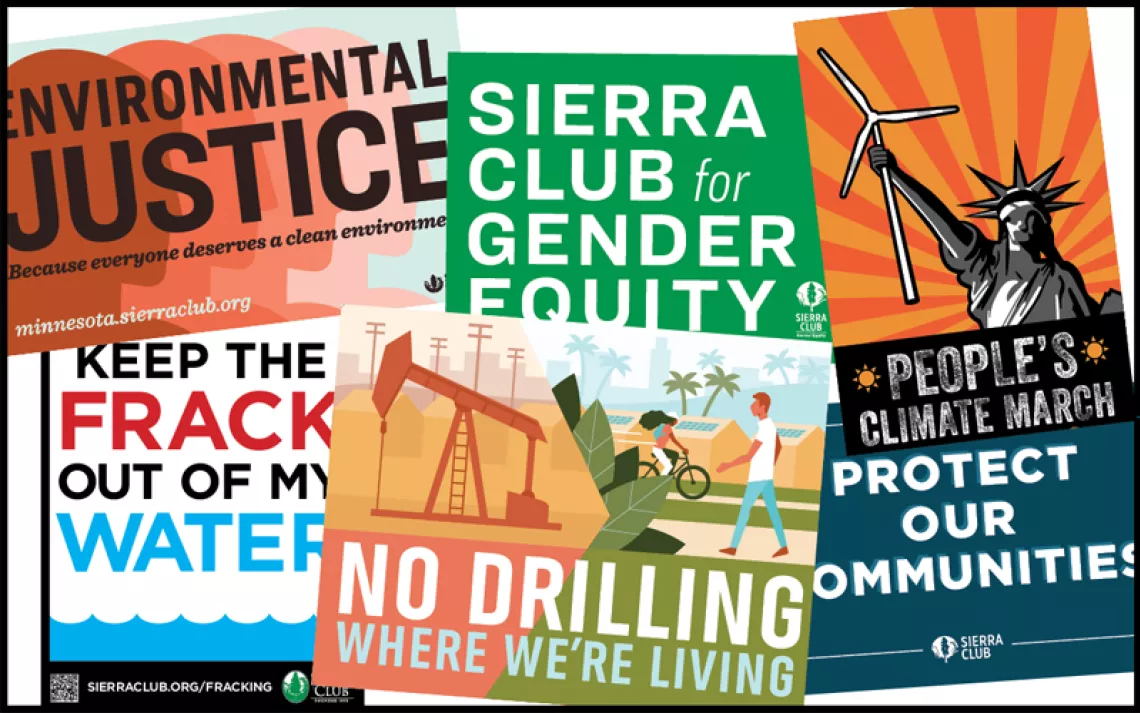What's the Sierra Club Been Up to Lately?
Alerts, campaign updates, and victories from Sierra Club volunteers and staff

A roundup of important news and updates from Sierra Club campaigns and chapters across the country.
By the Numbers
3: The number of the toxic red dye used in food manufacturing (including pink and purple marshmallow Peeps) that was banned by the state of California.
40: Countries that have declared a climate emergency in response to the growing intensity and frequency of human-driven disasters.
34: Billions of dollars that US insurers had to pay out during the first half of 2023 as a result of severe thunderstorms, a record number for that time period.
21: The number of species that the US Fish and Wildlife Service declared extinct this past fall. Most were birds and mussels for which protection came too late.
70: The percentage of Americans who think the US should ramp up renewable energy, according to a survey done by the League of Conservation Voters.
Alerts
Happy Birthday, ESA
As the Endangered Species Act marks its 50th year, we need President Biden to ensure that we have even stronger biodiversity and endangered species protections for the next 50 years. Send a message asking him to enact a whole-of-government approach and to support full funding of the ESA.
» Take action: sc.org/fund-esa
Rein In Methane
Methane has 80 times the planet-warming power of carbon dioxide in a 20-year time frame. New regulations on the gas—like required leak prevention and emissions monitoring—are crucial. But the Environmental Protection Agency has yet to finalize the new methane rules called for earlier this year by more than 400,000 people. Tell the EPA to implement the rules and protect our climate.
» Take action: sc.org/methane-safeguards
Victories
Arctic Oil Canceled
The Biden administration took a step in the right direction when it canceled Trump's oil and gas leases in the Arctic National Wildlife Refuge, but more lease sales are mandated in 2024. Tell the Bureau of Land Management that it must prioritize the protection of wildlife and subsistence practices.
» Take action: sc.org/no-arctic-oil
Good Neighbors Rule
The EPA has proposed a "Good Neighbor" rule, which forbids states with coal-burning power plants and other industrial sources from polluting neighboring states downwind. Sierra Club supporters wrote nearly 12,000 comments in support of a strong rule. Last summer, industry groups sued to prevent the standard from going into effect, but the US Court of Appeals for the DC Circuit blocked the attempt.
Cash In on EVs
Starting in January 2024, tax credits for new and used EVs will be available at the point of sale. At present, consumers have to wait until they file their taxes to get the credits, but next year buyers will get a $7,500 rebate for new electric vehicles and $4,000 for used ones, available at any dealership participating in the Internal Revenue Service's Home Energy Tax Credits program.
Get Plugged In
Get the latest environmental journalism from Sierra delivered straight to your inbox—along with priority actions from Sierra Club campaigns. Sign up today!
sc.org/the-latest
Check It Out
The Sierra Club's 2023 National Awards went to 33 individuals and groups for outstanding environmental work. Among them were Representative Pramila Jayapal, for her work on environmental justice; the Idaho Chapter, for its commitment to equity and inclusion; and Climate TRACE, for developing technology that tracks greenhouse gases.
» Read more: sc.org/2023-awards
Chapter Corner

ALL HANDS ON DECK
The Sierra Club of Hawai'i took part in the response to the Maui infernos that devastated Lāhainā in August. Members were involved with on-the-ground relief efforts and helped solicit and coordinate much-needed supplies, including backpacks and P100 respirator masks. In addition, they have been educating the public regarding related environmental hazards with the advice and support of Sierra Club Toxics Team members Sonya Lunder and Jane Williams. The chapter is also involved in legal efforts to stop developers' attempts to roll back critical water protections in the wake of the fires. "Grief still runs deep in the fires' tragic aftermath, and will for a long, long time," Wayne Tanaka, director of the Sierra Club of Hawai'i, wrote in a blog post. "Hawai'i's people will never stop mourning the lives lost and the utter destruction of the former Hawaiian Kingdom capital of Lāhainā."
30X30 RADIO
The Maine Chapter launched a podcast in October around the need to preserve 30 percent of the state's land, water, and forests by 2030 (bit.ly/30x30-podcast). As climate change and habitat destruction put more species in peril, protecting intact ecosystems is crucial to halting biodiversity loss. The podcast, Redefining Conservation, will explore the 30x30 goal's benefits for Maine and the strategies used to achieve it. "Redefining Conservation also gives us the opportunity to explore the intersection between conservation and other forms of social justice," chapter leaders wrote in a blog post. "We are planning on interviewing multiple key stakeholders, community organizers, and movement builders who will be part of creating our shared conservation future in Maine."
Campaign Updates
THE BIG APPLE PLUGS IN
In October, the New York City Council passed a measure to address the city's second-largest source of pollution—the transportation sector. Its legislation requires the city's 30,000 light- and medium-duty vehicles to be electric by 2035. This is big news because New York City's fleet—including ambulances, fire and trash trucks, school buses, and street sweepers—is the largest of any municipality's in the country. The measure was supported by the Sierra Club's New York City Group and Atlantic Chapter, and the Clean Transportation for All campaign helped with public outreach. "Eliminating tailpipe pollution from our city's fleet of tens of thousands of fossil fuel vehicles will have immense public health and climate benefits that are long overdue for many communities," Wayne Arden, vice chair of the Sierra Club's New York City Group, said when the measure passed.
BIDEN HAS THE LESSER PRAIRIE CHICKEN'S BACK
Over the summer, congressional Republicans tried to revoke federal protections for the northern long-eared bat (at the behest of the logging industry) and the lesser prairie chicken (a favor to Big Oil). The measures would have usurped the authority of the Fish and Wildlife Service, which normally regulates the listing of species, but President Biden vetoed both. The Sierra Club's Our Wild America campaign was involved in the effort to retain the vital protections. "President Biden made the right call in vetoing these two damaging resolutions," said Bradley Williams, the Sierra Club's associate director of legislative and administrative advocacy, wildlife, and lands protection. "This administration has identified addressing climate change as one of its top priorities, and protecting biodiversity is a key part of that."
 The Magazine of The Sierra Club
The Magazine of The Sierra Club


